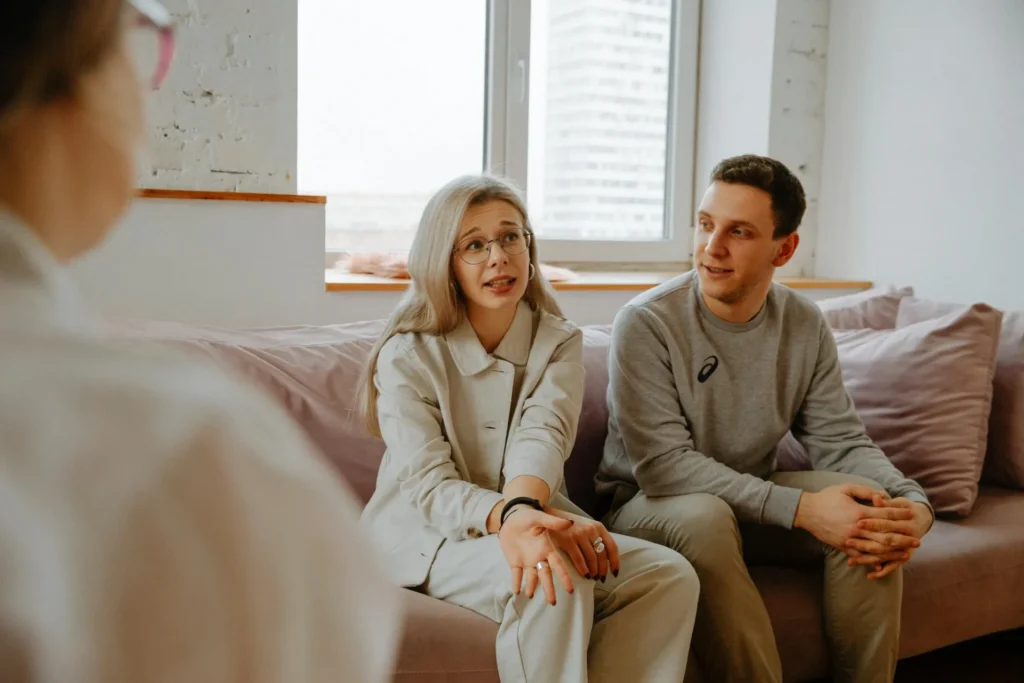Couples facing challenges with intimacy and understanding one another can benefit from meeting with a professional third party. A couples therapist has the knowledge, training, and intervention tools to assist couples as they work through any issues.
| Challenge | How a Couples Therapist Helps |
|---|
| Communication Issues | Teaches active listening and healthy ways to express emotions, reducing misunderstandings. |
| Frequent Arguments | It helps identify underlying issues causing conflicts and provides strategies to resolve them calmly. |
| Trust and Betrayal | Guides couples through rebuilding trust after betrayal, focusing on honesty and emotional healing. |
| Emotional Distance | Encourages deeper emotional connection by addressing unmet needs and improving intimacy. |
| Different Love Languages | Helps partners understand and respond to each other’s love language to strengthen their bond. |
| Major Life Transitions | Supports couples in navigating big changes like marriage, parenthood, or career shifts together. |
| Unresolved Past Issues | Assists in processing past experiences that may be affecting the current relationship. |
Here is How Such Therapists Help with Relationship Problems:
Facilitating Communication

A couples therapist creates an environment where both parties may communicate openly. This enables each person to hear the other party without interruption or interjection. The therapist encourages both partners to use simple language and expressions or explain in ways that the other person understands. Open, clear communication lets the couple engage in meaningful conversation while minimizing harmful or reactive exchanges. The partners can learn to voice their needs without blame and hear concerns without defensiveness.
Mediating Emotional Interactions
Intense conflicts between partners may lead to feelings of anger and resentment. Relationship counselors teach the couple to recognize and de-escalate these emotional moments before they become detrimental.
- The expert helps partners express concerns constructively without being hurtful.
- They assist with reframing criticism into constructive feedback that fosters understanding and emotional connection.
- Partners who need reassurance can learn how to express their thoughts and needs rather than bottling up their emotions.
- The therapist’s intervention encourages positive interactions by showing couples how to be teammates rather than opponents during heated moments.
Educating the Couple
| Key Aspect | How a Couples Therapist Helps |
|---|
| Understanding Relationships | Teaches couples about what makes a relationship healthy, including emotional connection and communication. |
| Recognizing Stress Cycles | Helps identify patterns of stress and conflict that may be affecting the relationship. |
| Attachment Issues | Explains how past experiences and attachment styles influence the way partners interact. |
| Love Languages | Guides couples in understanding and responding to each other’s love language to strengthen their bond. |
| Emotional Awareness | Encourages both partners to recognize and validate each other’s emotions for a deeper connection. |
| Proactive Relationship Building | Equips couples with tools to maintain a strong and healthy relationship beyond therapy. |
Identifying Behavior and Interaction Patterns

Relationships may naturally develop distinct behaviors and patterns as couples grow closer. Relationship advisors assess these interaction dynamics between partners and those around them. A counselor might observe one partner responding with sarcasm when the other shares concerns. Recognizing these habits can help couples break free from negative behavior loops, address unresolved grievances, and identify triggers for arguments.
Shifting the Couple’s Perspective
Everyone has a unique perspective shaped by personal experiences, culture, beliefs, and ideologies. Therapy often involves exploring issues from both partners’ viewpoints. One partner’s consistent need for attention may seem like insecurity but could actually reflect deep affection. The therapist helps each partner understand the intentions behind actions and conversations. Reframing perspectives can foster empathy and reassure couples that solutions are possible, even during emotional confrontations.
Setting Boundaries
Healthy relationships may require space and alone time for reflection. Relationship counselors teach couples the significance of allowing each partner time to enjoy hobbies or focus on work. Setting boundaries also extends to intimacy, helping partners communicate their comfort levels and find compromises. This approach can prevent resentment and help make sure both partners feel heard and valued.
Building Intimacy
Intimacy involves both emotional closeness and physical connection. Counselors guide couples toward becoming more open and connected by encouraging vulnerability. Exercises like sharing the highs and lows of the week can help reignite closeness. A therapist may also encourage the couple to find a shared dream, such as traveling. These dreams provide ways to create meaningful experiences together and may strengthen intimacy through working to fulfill shared goals.
Book a Couples Therapist Appointment
Couples therapy equips partners to heal together and create a relationship with a strong, long-lasting bond. You may choose to find a relationship counselor if you have constant disagreements, misunderstandings, and other unresolved issues with your partner. Consult a couples therapist today to help rekindle intimacy in your relationship.
FAQs
What does a couples therapist do?
A couples therapist helps partners communicate better, resolve conflicts, and rebuild trust. They act as a neutral guide, offering tools and strategies to strengthen the relationship.
When should we see a couples therapist?
If you’re struggling with constant arguments, trust issues, emotional distance, or major life changes, therapy can help. You don’t have to wait for a crisis—early intervention can prevent bigger problems.
Will a therapist tell us who’s right and who’s wrong?
No. A good therapist doesn’t take sides but instead helps both partners understand each other’s perspectives and find healthy ways to navigate disagreements.
Can couples therapy really save a relationship?
While therapy can’t guarantee a relationship will last, it can significantly improve communication, emotional connection, and problem-solving skills. Many couples find that therapy helps them rediscover their bond.
What if my partner doesn’t want to go to therapy?
It’s common for one partner to be hesitant. Start by having an open conversation about why you think therapy could help. If they’re unsure, you can attend individual sessions first to work on your part of the relationship.
How long does couples therapy take?
It depends on the couple’s needs. Some see improvements in a few sessions, while others benefit from longer-term therapy. Your therapist will tailor the process based on your specific challenges and goals.
Is couples therapy only for married couples?
Not at all! Therapy is helpful for any type of relationship—married, dating, engaged, or even separated couples trying to co-parent or navigate closure in a healthy way.

